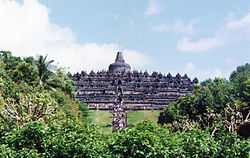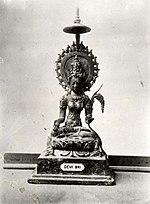Aliran Kepercayaan
| Part of a series on |
| Religion of Java |
|---|
 |
| This article is a part of the series on |
| Indonesian mythology and folklore |
|---|
 |
|
|

Aliran Kepercayaan[note 1] (English: the branches/flows of beliefs) is an official cover term for groups of followers of various religious movements. It also includes various, partly syncretic forms of mysticism of new religious movements in Indonesia, such as kebatinan, kejiwaan, and kerohanian.[2] In the Indonesian language, it is also used for new religious movements in other parts of the world. Based on data collected by the Indonesian Conference on Religion and Peace (ICRP), there are about 245 unofficial indigenous religions in Indonesia.[3]
Characteristics
[edit]According to Caldarola, kepercayaan "is not an apt characterization of what the mystical groups have in common".[2] The US State Department's states:
Sizeable populations in Java, Kalimantan, and Papua practice animism and other types of traditional belief systems termed "Aliran Kepercayaan." Many of those who practice Kepercayaan describe it as more of a meditation-based spiritual path than a religion. Some animists combine their beliefs with one of the government-recognized religions.[4]
Recognition
[edit]The Indonesian Government recognizes the right to follow Aliran Kepercayaan, as long as its practitioners do not upset the public order or offend the sensitivities of the followers of the major religions.[citation needed]
Indonesia's Constitutional Court in November 2017 ruled that followers of faiths outside the 6 recognized religions are allowed to state "Kepercayaan kepada Tuhan YME[note 2] in their national identity cards, as a 7th category for Aliran Kepercayaan after judicial review launched by followers of Marapu religion, the Parmalim, Kaharingan, and Sapta Darma.[5]
Notes
[edit]- ^ Full: Kepercayaan kepada Tuhan Yang Maha Esa,[1] "Believer of One Supreme God".[citation needed]
- ^ Full: Yang Maha Esa
References
[edit]- ^ UNHCR
- ^ a b Caldarola 1982, p. 539, note 30.
- ^ Aritonang, Margareth S. (7 November 2014). "Government to recognise minority faiths". The Jakarta Post. Retrieved 2 October 2014.
- ^ "International Religious Freedom Report 2005 (Indonesia)"
- ^ "Indonesia's Constitutional Court Says Yes to Indigenous Faiths".
Sources
[edit]- Caldarola, Carlo (1982), Religion and Societies: Asia and the Middle East, Walter de Gruyter
- Ensiklopedi Kepercayaan terhadap Tuhan Yang Maha Esa [Encyclopedia of Beliefs in One God] (PDF) (in Indonesian) (4th ed.). Jakarta: Direktorat Jenderal Nilai Budaya, Seni dan Film; Direktorat Kepercayaan Terhadap Tuhan Yang Maha Esa. 2010 [2003]. ISBN 978-979-16071-1-7.
External links
[edit]
